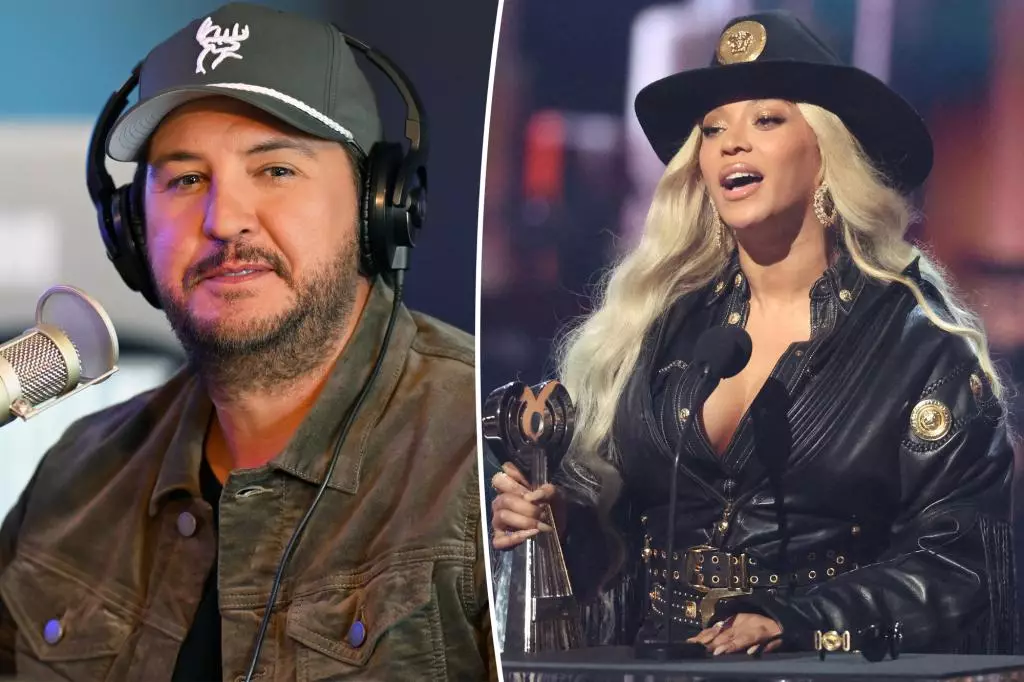In a climate where musical genres are increasingly fluid, the recent remarks by Luke Bryan regarding Beyoncé’s entry into country music spark a broader discussion on inclusivity, identity, and the parameters by which we define genres. Beyoncé, a titan of pop music, released “Cowboy Carter,” an album that dominated the charts and raised eyebrows across the country music landscape. Despite its success, her exclusion from the Country Music Association (CMA) Awards nominations has ignited passionate conversations about what it means to belong to a particular music genre.
Luke Bryan’s comments on the matter highlight an internal conflict within the country music community. On SiriusXM’s “Andy Cohen Live,” he emphasized the need for artists, especially high-profile names like Beyoncé, to engage with the country music community more deeply. He stated, “But come to an award show and high-five us, and have fun and get in the family, too.” This statement underlines a crucial aspect of the country music culture where community and familial bonds are held in high regard. However, this sentiment raises a critical question: Should an artist have to conform to the communal expectations of a genre to be recognized within it?
Bryan’s assertions also touch on a potential gatekeeping mentality. While he articulated that the music industry welcomes artists from various backgrounds to explore country sounds, his insistence on a deeper “involvement” may unintentionally suggest that newcomers must earn their place through approval from established artists. This can create barriers for artists like Beyoncé, whose cultural relevance and musical prowess extend far beyond traditional country lines.
Dolly Parton extended a nuanced perspective on the issue, defending the CMA voting committee while recognizing Beyoncé’s contributions. Her comments reflected an understanding of the challenges artists face when navigating genre-centric communities. Parton articulated that the exclusion may not have been intentional or personal but rather a reflection of the awards climate and the competitive nature of genre nominations. “There’s so many wonderful country artists…they probably thought, well, we can’t really leave out some of the ones that spend their whole life doing that,” Parton explained.
This raises the point that traditional country music is often tightly woven into the identities of the artists who have dedicated their careers to it. The challenge, therefore, lies in evolving the genre to be more inclusive without disregarding those who have sustained it over decades. As musical styles evolve and cross-pollinate, there is a pressing need for the country music industry to reconcile its roots with the diverse influences that contemporary artists bring to the table.
Beyoncé’s dedicated fan base, known as the Beyhive, has passionately defended her from the criticisms surrounding her CMA nominations snub. Luke Bryan noted, “Beyoncé has a lot of fans out there that have her back,” illustrating the intense loyalty she commands across music genres. However, this also points to a larger culture within fandoms, where supporters champion their idols fiercely, often landing them in contentious positions with traditionalists who may feel their genre is being diluted.
Kelly Clarkson, herself a crossover artist, echoed similar sentiments about the challenges of breaking into country music. Her own experience serves as a cautionary tale about the rigid expectations that can exist within musical genres, stating that she was advised to fully abandon pop music for her music to be recognized in country circles. Such experiences illuminate the difficulty of genuine artistic expression in an industry that may prioritize conformity over innovation.
A Journey Towards Acceptance
Beyoncé’s decision to delve into country music stems from a personal narrative rather than a mere commercial interest. She herself has acknowledged the pushback she faced when she first ventured into this genre, outlining the motivation behind her album as stemming from a desire to understand country music’s rich history. Her statement about being prepared for criticism points to a journey shaped by resilience and introspection—qualities that any artist must cultivate when challenged by genre boundaries.
The struggle for acceptance within country music also reveals a more profound, systemic issue that pervades the industry: the need for genres to adapt and embrace voices beyond their historical confines. As the landscape of music continues to shift, the discussions surrounding Beyoncé’s work should serve as a catalyst for broader conversations about inclusivity, artistic validity, and the ethos of community in an ever-evolving artistic world.
The dialogue spurred by Beyoncé’s “Cowboy Carter” serves as a reflective moment for the country music genre, where tradition meets modernity, and the exploration of what it means to be part of a “family,” as Luke Bryan put it, becomes more relevant than ever. The opportunity for growth lies in recognizing that music too, like identity, can be multifaceted and transcend any single definition or boundary.
